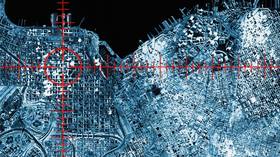US spies urged to buy more private intelligence
Politicians seek to expand a pilot project to purchase satellite images from private firms

US lawmakers have called on the country’s spy satellite agency to accelerate its use of commercially available images “to the extent possible” to close gaps in the Pentagon’s own surveillance capabilities.
The House Armed Services strategic forces subcommittee, which is tasked with overseeing the US military's use of space, anti-ballistic missile defense and nuclear deterrence forces, included the proposal in its amendments to a defense spending bill for 2023.
The markup document, which is yet to be approved and will be considered by the full committee on June 22, endorses a pilot program to buy images from commercial satellites using synthetic aperture radar (SAR).
“The committee recommends the NRO accelerate, to the extent possible, their adoption and integration of proven highly capable U.S. commercial SAR systems” to cover “known intelligence, surveillance, and reconnaissance gaps of the Department of Defense,” the documents states.
SAR imaging uses the movement of radar antenna to boost spatial resolution, compared to a stationary beaming radar system. The “synthetic aperture” in the name refers to the fact that the antenna works as if it had a larger size by combining data collected over a period of time. A similar principle allows astronomers to use radio telescopes located in different parts of the world to combine their feeds and observe distant objects in greater detail.
In January, the NRO granted contracts to five SAR-sat companies to provide their images to the US military. They were the US division of European giant Airbus, California startup Capella Space, the US branch of the Finnish firm ICEYE’s, Florida-based PredaSAR and California-based Umbra.
In April, the director of the NRO’s Commercial Systems Program Office, Pete Muend, praised the contribution of the five firms in providing intelligence on Ukraine. He noted that the commercial status of the source material allowed the NRO to share it with the Ukrainian government, which is otherwise barred from receiving most US classified intelligence.
“They’re not a NATO nation, right? So we can’t share the good stuff with them,” he said at the GEOINT 2022 symposium. “And so that has created this massive opportunity for unclassified American commercial imagery to play a huge role.”
Russia has repeatedly said that the Pentagon's outsourcing of space capabilities to the private sector essentially turns commercial assets into an extension of US military infrastructure. A recent high-profile example is the SpaceX satellite internet program Starlink.
After the start of the conflict in Ukraine, CEO Elon Musk offered to make the service available in the country, and the US government procured Starlink equipment for Ukrainian troops.
https://www.rt.com/news/556863-pentagon-commercial-satellites-intelligence/


0 Comments:
Post a Comment
Subscribe to Post Comments [Atom]
<< Home